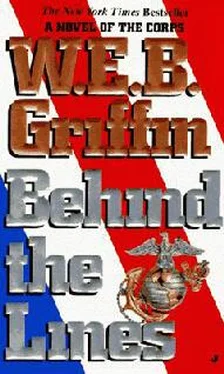W.E.B. Griffin - The Corps VII - Behind the Lines
Здесь есть возможность читать онлайн «W.E.B. Griffin - The Corps VII - Behind the Lines» весь текст электронной книги совершенно бесплатно (целиком полную версию без сокращений). В некоторых случаях можно слушать аудио, скачать через торрент в формате fb2 и присутствует краткое содержание. Жанр: prose_military, на английском языке. Описание произведения, (предисловие) а так же отзывы посетителей доступны на портале библиотеки ЛибКат.
- Название:The Corps VII - Behind the Lines
- Автор:
- Жанр:
- Год:неизвестен
- ISBN:нет данных
- Рейтинг книги:3 / 5. Голосов: 1
-
Избранное:Добавить в избранное
- Отзывы:
-
Ваша оценка:
- 60
- 1
- 2
- 3
- 4
- 5
The Corps VII - Behind the Lines: краткое содержание, описание и аннотация
Предлагаем к чтению аннотацию, описание, краткое содержание или предисловие (зависит от того, что написал сам автор книги «The Corps VII - Behind the Lines»). Если вы не нашли необходимую информацию о книге — напишите в комментариях, мы постараемся отыскать её.
The Corps VII - Behind the Lines — читать онлайн бесплатно полную книгу (весь текст) целиком
Ниже представлен текст книги, разбитый по страницам. Система сохранения места последней прочитанной страницы, позволяет с удобством читать онлайн бесплатно книгу «The Corps VII - Behind the Lines», без необходимости каждый раз заново искать на чём Вы остановились. Поставьте закладку, и сможете в любой момент перейти на страницу, на которой закончили чтение.
Интервал:
Закладка:
The boy came to attention and saluted.
"Staff Sergeant Koffler, U.S. Marine Corps, reporting, Sir."
General Fertig returned the salute.
"Reporting from where, Sergeant?" Fertig asked as he reached up and took his trousers from the lean-to wall.
The boy took some time to consider the question. It seemed to confuse him for a moment.
"From Australia, Sir. General Pickering sent us."
Thank God!
"And who is General Pickering?"
That question also seemed to momentarily confuse him.
"He's a Marine general, Sir. We work for him."
"You landed by submarine?" Fertig asked as he pushed his legs into his still-soggy trousers.
"Yes, Sir. We came off the Sunfish."
"And how many of you are there?"
"Three of us, Sir. Plus an officer from the OSS."
What the hell is the OSS?
'And the name of your commanding officer?"
"McCoy, Sir. Lieutenant McCoy."
They sent a lieutenant? Well, that certainly establishes our position, doesn't it?
"And where is Lieutenant McCoy?"
"I left him on the beach with the supplies, Sir. Lieutenant Everly rode me on his motorcycle to where we met Captain Hedges. Captain Hedges sent this guy-he pointed to a Filipino standing to one side-to bring me on the motor-cycle to you, and then he took the patrol back to the beach."
"What sort of supplies, Sergeant?"
"Some weapons, Sir, some medicine, other stuff. And the gold, too, of course."
"Gold?" Fertig asked as he pulled on his boots.
"Yes, Sir," Koffler said, and pulled his dyed-black khaki shirt out of his trousers.
Around his waist were two dully gleaming black belts. One formed a tube about two inches wide. The second was narrower, with a package, about five inches square, in the center. Koffler untied the cords that closed the tubular belt and handed it to Fertig. It was a good deal heavier than it looked.
God, is there really gold in here?
Fertig felt what could be coins under the strange, smooth, slippery mate-rial. He tried to find an opening.
"If you want to open that, Sir," Koffler said helpfully, "you're going to have to cut it. That plastic can't be torn."
Fertig looked at him.
Koffler ducked out of the cord around his neck and handed Fertig the sword.
"What is 'plastic,' Sergeant?" he asked, taking the sword and testing the blade with his thumb. It was as sharp as a razor.
"I don't really know what it is, Sir," Koffler said. "The Army started packing their radios in it, and we used it to pack the stuff we brought you."
Fertig slit the plastic. A gleaming United States twenty-dollar gold piece fell out.
"We're each wearing a money belt, General," Koffler said. "And there are a couple of bundles back on the beach. There's two hundred and fifty thou-sand dollars in all."
If they're sending me that kind of money, somebody is taking us seriously.
"And you were sent here to deliver the gold?"
"No, Sir. I was sent here to find you, and when I did, to call Australia."
"We have a radio, but at the moment it's not working. We're on the move, as you can see."
"I've got a radio, General," Koffler said. "I've got two hours' worth of batteries, so if you've got a generator, that would be helpful. But all I really need is some help to string my antenna. I can be on the air in a couple of min-utes."
"You're a radio operator, Sergeant?"
"Yes, Sir. That's why General Pickering sent me."
Fertig looked at the Filipino.
"Ask Lieutenant Ball and Sergeant LaMadrid to report to me, would you, please?" he said. He turned back to Koffler. "Lieutenant Ball is my signal officer," he said. "They'll string your antenna for you."
"Yes, Sir. Thank you."
"This is interesting," Fertig said, fingering the sword. "What is it?"
"Lieutenant McCoy told me that when the war just started, some Army asshole-"
He stopped, horrified at what he had just said.
"It's all right, Sergeant. I am perfectly willing to agree that there are a number of assholes in the United States Army."
"Some Army guy sent twenty thousand of them to Australia. They're Cavalry sabers. An Ordnance officer-an Army Ordnance officer-cut them down and sharpened them. They make pretty good machetes. Good steel in them."
"I see. And that weapon of yours?"
Koffler handed it to him.
"It's what they call a carbine, General. Sort of halfway between a pistol and a rifle. Fifteen shots. They're good out to about a hundred yards. We brought you a hundred of them. If they got them all off the submarine. They were going to try to unload some more stuff, maybe all we brought, if the Japs didn't show up."
"Interesting weapon," Fertig said, turning it over in his hands.
"Colonel Stecker and McCoy decided it would be smarter to bring car-bines than rifles. They're smaller, the ammo doesn't weigh as much, and the Colonel thought that your Filipinos could probably handle them better than rifles."
"Colonel Stecker? Who is he, Sergeant?"
"Marine Colonel, Sir. He won the Medal of Honor in the First World War. He was supposed to come in with us, but they're going to make him a general and send him to Washington, so he couldn't."
So at least two people more senior than a lieutenant are involved in this. Thank God!
And then another question occurred to him.
"Did you meet Captain Weston?"
"Yes, Sir."
"Presumably, he is with your lieutenant-McCoy, I believe you said?- on the beach?"
"Yes, Sir. Lieutenant McCoy. No, Sir. Mr. McCoy sent him to Australia on the submarine."
"He did what?" Fertig asked, at first greatly surprised, and then suddenly annoyed. "On whose authority?" he wondered angrily, aloud.
"Mr. McCoy sent him to Australia, Sir," Koffler said. "I guess he figured he had the authority to do that, otherwise he wouldn't have done it."
"I can't wait to meet Lieutenant McCoy," Fertig said.
Lieutenant Robert Ball appeared, sleepy-eyed. He looked at Koffler with undisguised curiosity.
"You sent for me, General?"
"This is Staff Sergeant Koffler of the United States Marines," Fertig said. "He needs some assistance to erect an antenna. He intends to communicate with Australia with it. Would you and Sergeant LaMadrid assist him, please?"
"Yes, Sir," Ball said. He offered his hand to Koffler. "I hope you've got some wire?"
"Yes, Sir. I've cut a straight wire for the twenty-meter band, insulators and everything. It's in one of the parcels."
"And you have a radio?"
"A radio, a key, and enough batteries for two hours. Have you got a gener-ator?"
"It'll take an hour to get it running; it's in pieces."
"Then I guess we better go with the batteries for now," Koffler said. "It won't take long. But I am going to need a generator pretty soon."
With Lieutenant Ball and Sergeant LaMadrid-and halfway through the pro-cess, General Fertig-as a fascinated audience, Sergeant Koffler carefully removed the plastic coating from several packages. There were four identical packages, each containing a battery. Others held a neatly coiled roll of copper wire to which were attached ceramic insulators; a receiver; a transmitter; a high-speed telegraphic key; and a small set of headphones.
The receiving and transmitting antennae were quickly erected. Koffler pulled his shirt from his trousers again and untied the second plastic belt.
With all the care of a surgeon, he used his machete to slit open the square package.
"Gotta be careful as hell with this," he explained. "Not only is it printed on what looks like toilet paper, but it's soaked in some chemical that makes it practically explode if you get a match near it."
Inside the package was an oilskin envelope. Koffler opened it, removed a pad of paper, tore the first sheet from it, and carefully tucked it in his pocket. Then he put the pad of paper back in the oilskin envelope, carefully closed it, and looked at Lieutenant Ball.
Читать дальшеИнтервал:
Закладка:
Похожие книги на «The Corps VII - Behind the Lines»
Представляем Вашему вниманию похожие книги на «The Corps VII - Behind the Lines» списком для выбора. Мы отобрали схожую по названию и смыслу литературу в надежде предоставить читателям больше вариантов отыскать новые, интересные, ещё непрочитанные произведения.
Обсуждение, отзывы о книге «The Corps VII - Behind the Lines» и просто собственные мнения читателей. Оставьте ваши комментарии, напишите, что Вы думаете о произведении, его смысле или главных героях. Укажите что конкретно понравилось, а что нет, и почему Вы так считаете.










